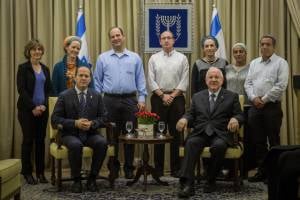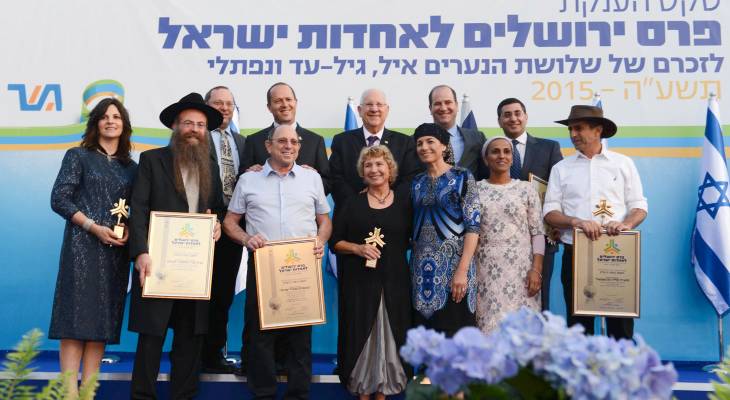
President Reuven Rivlin (seated right), Jerusalem Mayor Nir Barkat (seated left), and families of the three abducted teens, Eyal Ifrach, Naftali Frenkel, and Gilad Shaer, pose at the inauguration event for the new Jerusalem Unity Prize. (Hadas Parush/Flash90)
Israeli President Reuven Rivlin hosted the inaugural Jerusalem Unity Prize award ceremony at the President’s residence in honor of kidnapped and murdered Jewish teens Gilad Shaer, Eyal Yifrach, and Naftali Frenkel.
Israeli President Reuven Rivlin and his wife Nechama hosted the inaugural Jerusalem Unity Prize award ceremony last week at the President’s Residence in honor of kidnapped and murdered Jewish teens Gilad Shaer, Eyal Yifrach, and Naftali Frenkel.
The prize is the joint initiative of the boys’ families, Jerusalem Mayor Nir Barkat, and Gesher, a non-profit organization dedicated to bridging the gaps between different segments of Israeli society. Its purpose is to recognize individuals and organizations who contribute to unity among Jewish communities and Israeli society, and it was distributed on the newly declared Unity Day, also created in memory of the teenage boys killed by Hamas last year.
The Unity Prize is awarded in three categories: Israel-Diaspora, Social Initiative, and Individual. The Chabad House in Bangkok, Thailand, under the leadership of Rabbi Nechemya Wilhelm, won in the Israel-Diaspora, category; “Nifgashim Beshvil Israel” (“Meeting for Israel – on the Israel Trail”), an annual hike of the Israel National Trail initiated by Raya and Yossi Epner in memory of their son Avi, who died in the 1997 military helicopter tragedy, won in Social Initiative; and the Meetchabrim (“Connecting”) organization’s founder IDF Brig. Gen. (Ret.) Ram Shmueli as well as musician Rabbi David Menachem won in the third category.
“Different as we may be, we have a bright future here together,” said Rachel Frenkel, Naftali’s mother, at the ceremony. Rivlin said that “thanks to the prize winners, we are reminded that mutual responsibility, unity, and solidarity are important challenges during difficult times and even during mundane times.”
By: Israel Hayom/Exclusive to JNS.org
